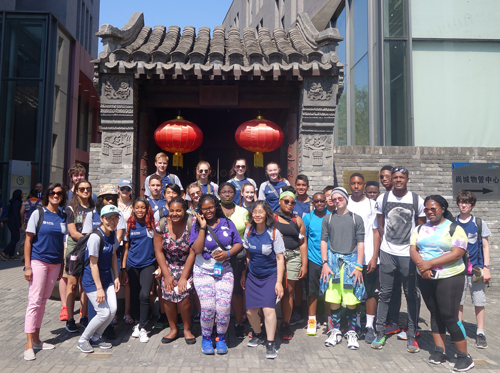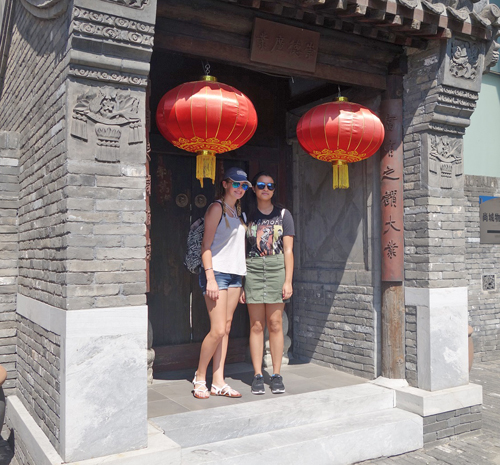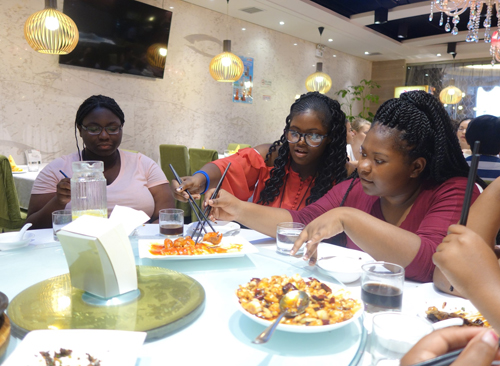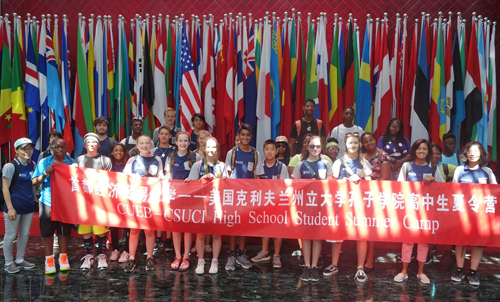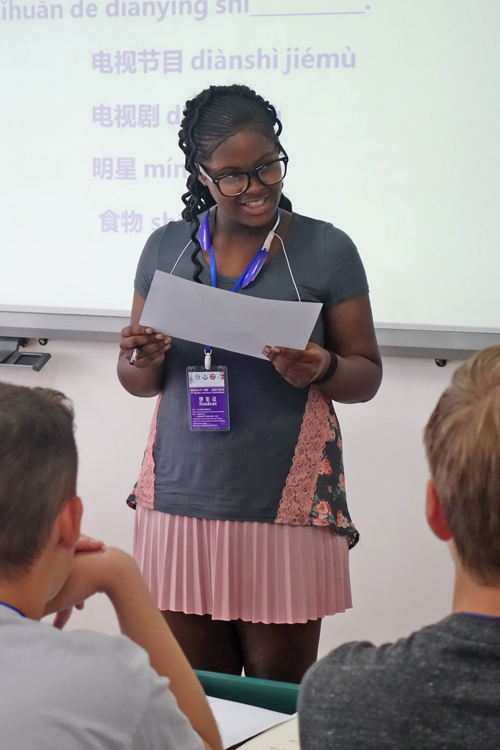In the summer of 2017, twenty-seven American students from eleven different schools received the opportunity of a lifetime. Thanks to the co-sponsorship of the Honorable Marcia Fudge and Chinese Vice Premier LIU Yandong, these students were able to partake in the Chinese Bridge Program. Through the program, organized by the Cleveland State University Confucius Institute and joint-organized by the Capital University of Economics and Business(CUEB) in Beijing and Yunnan Normal University in Kunming, students received the chance to spend two weeks immersed in Chinese language, history, food, sights and culture in the cities of Beijing and Kunming (of Yunnan Province).  Preparing for the flight to Beijing
Preparing for the flight to Beijing

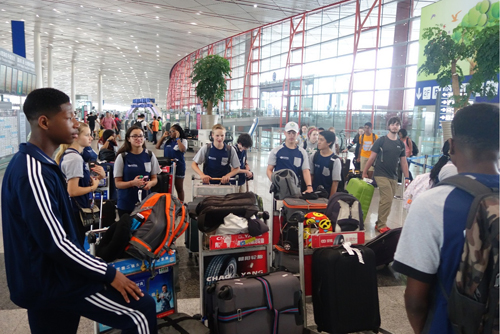
In the Beijing airport
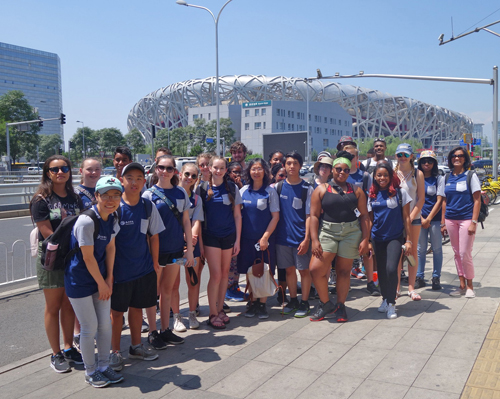
From June 17th through July 1st, students enjoyed the once in a life time experience of immersing themselves in Chinese culture and language in order to learn about Chinese culture, history, and the cultural similarities between the United States and China. On the day of their first event, students of the camp were greeted with a traditional Chinese gate at the Confucius Institute Headquarters in Beijing. This gate, an example of traditional Chinese architecture, is nestled among modern buildings. Students were in awe at the seamless blend of traditional Chinese architecture and the modern.
Student Aaron Brown from NIHF STEM High School delivered a speech to his fellow students and their Chinese hosts upon the students' arrival at CUEB. In his speech, Aaron talked about the opportunity to learn about becoming global leaders, and how the experience of the Chinese Bridge Summer Camp Program offers students a challenge to become leaders themselves. He also pointed out that the individual experiences for the students would have a tremendous impact on how they get to know better the culture, history and language of China.
One of the biggest benefits for the summer camp students was the chance to fully immerse themselves in a foreign culture. Many of the summer camp students were surprised about how different the actual culture of China was to the Americanized version they were used to experience here in the United States. Food, in particular, was one of the major differences students noticed. Authentic Chinese food is vastly different than what most Americans are used to. Nonetheless, summer camp students were excited for the challenge, and were eager to sample as much local and authentic food as possible.
The lobby of the Confucius Institute Headquarters greeted students with flags from around the world, and summer camp students were treated to an expose on Chinese culture.
Upon arrival, summer camp students were able to try on traditional Peking Opera costumes, handle traditional Chinese fans, and other cultural totems. They learned about Confucius himself and many of his teachings, and also experimented on traditional Chinese musical instruments. A favorite musical instrument among the students was the Bianzhong, a traditional Chinese instrument consisting of a set of bronze bells that are played by striking them with a wooden rod.
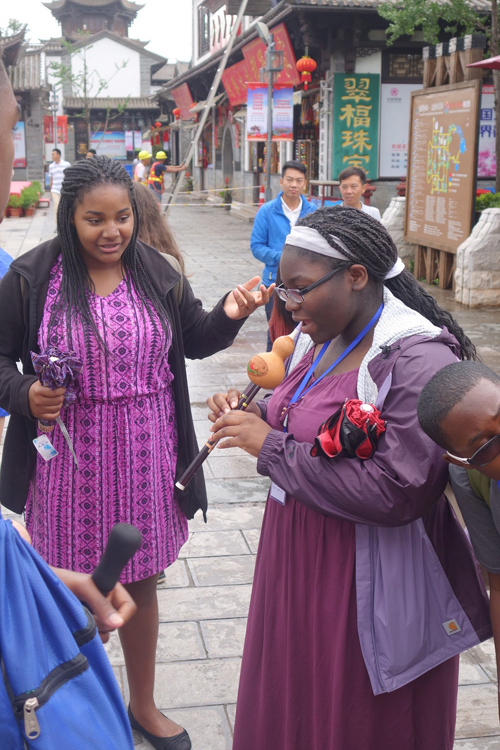
A souvenir cucurbit flute
The trip was split into two legs, with students experiencing the language, culture, and history of the metropolitan city of Beijing, and the less modern city of Kunming in the Yunnan Provence. While students enjoyed the art, culture and history of both cities, each city offered a unique, beautiful, and exciting set of experiences.

The modern city of Beijing
While in Beijing, summer camp students got to carry both the traditional and the modern into their experiences through trips to the Great Wall, the Forbidden City, the alleys, traditional courtyard and the 798 Art Zone. The Forbidden City was the Chinese Imperial Palace for nearly five hundred years.
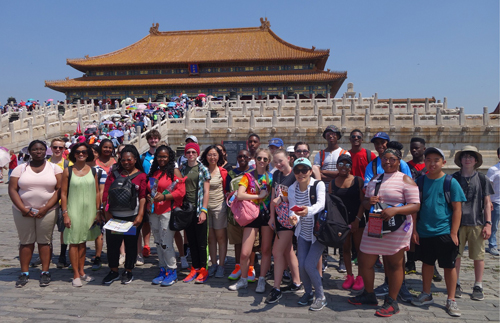
The Forbidden City
Now home to the Palace Museum, this example of traditional Chinese culture and architecture is still nestled in the heart of Beijing. While at the Forbidden City, summer camp students were able to learn about the history and culture of the Chinese government. They also enjoyed a ride on traditional Chinese rickshaws in the alleys, as well as paying a visit to a traditional home of a Chinese family.
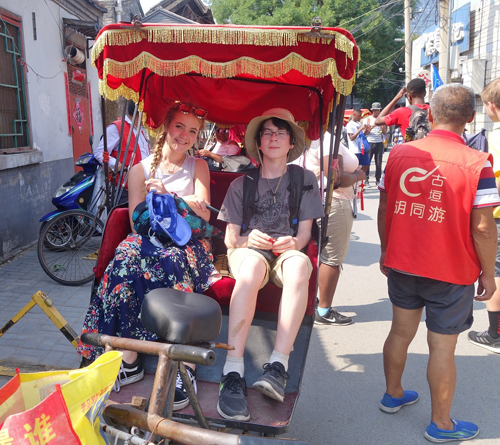 Riding in a rickshaw
Riding in a rickshaw
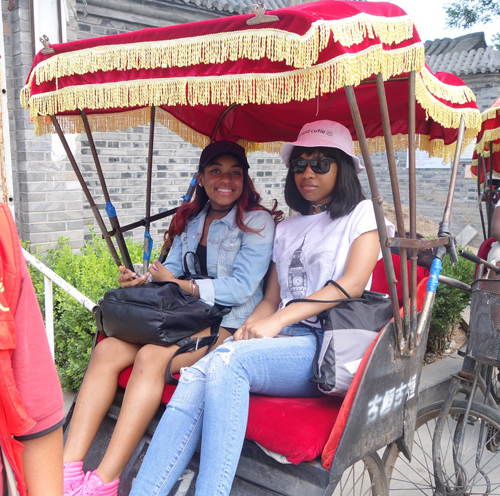
Similarly, part of the Great Wall of China passes through Beijing, offering the summer camp students a chance to experience a seminal part of Chinese history.
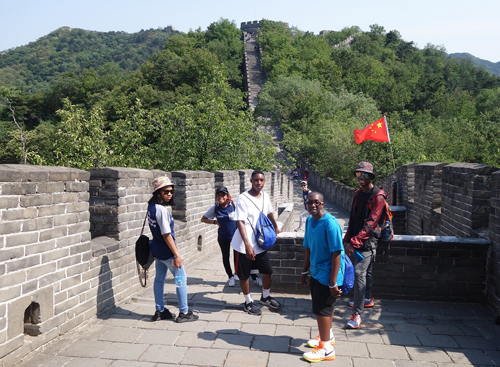
Great Wall of China 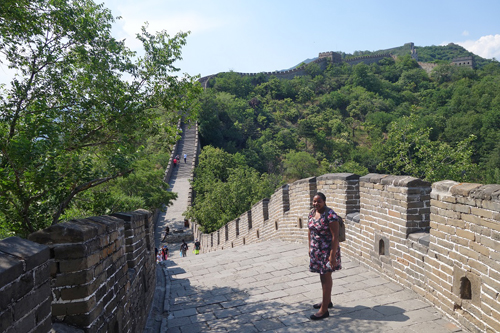
The fact that the section of the wall that passes through Beijing is a continuous tourist attraction that has been renovated several times in modern years, it provides another example to camp students about how China cherishes its history while still continues to be a modern city.
The modernity of the city can definitely be experienced in areas such as the 798 Art District that the students visited while in Beijing. Also known as the Dashanzi Art District, the 798 Art Zone consists of decommissioned military factory buildings that include unique architectural examples and a thriving ultra-modern arts community. While there, summer camp students were able to shop at local street vendors, examine modern Chinese art, and immerse themselves in a unique experience that could only be had in China.
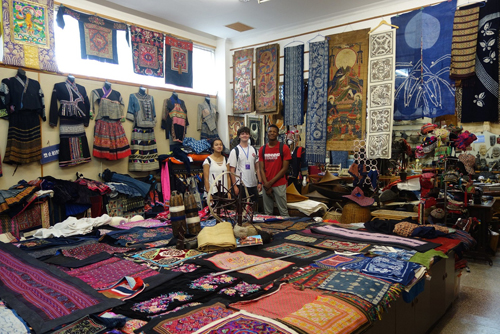
Beautiful minority clothing
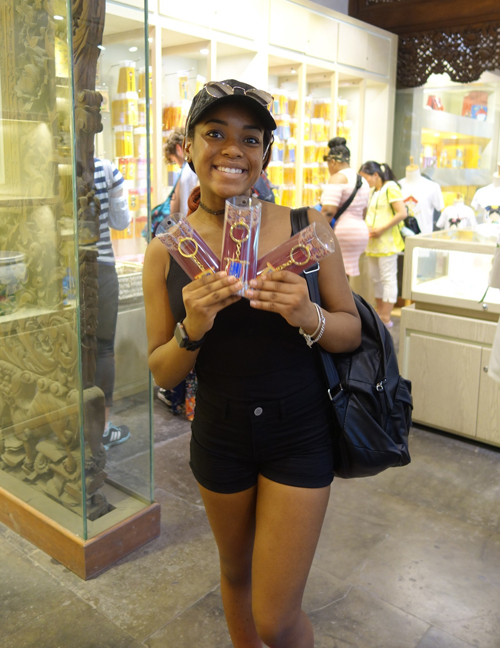
Shopping for souvenirs
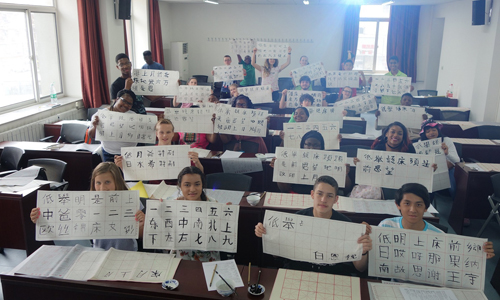
Showing their calligraphy skills
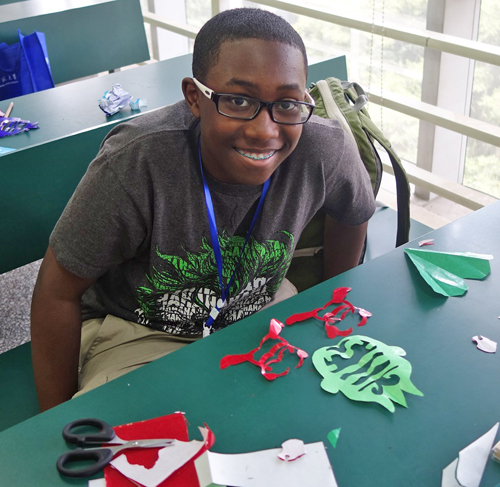
Paper cutting
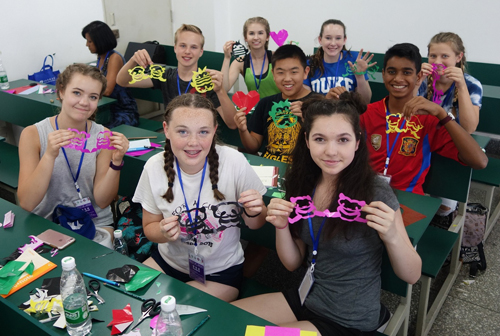
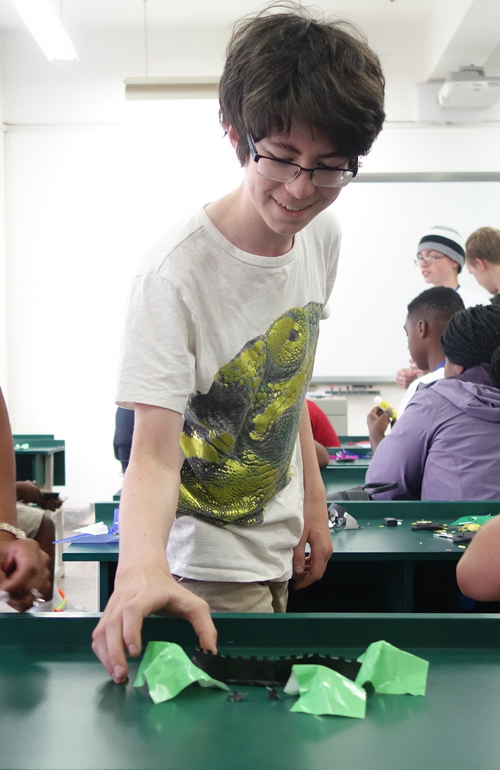
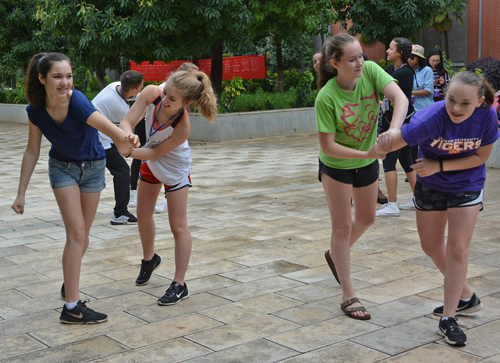
Learning Chinese martial arts
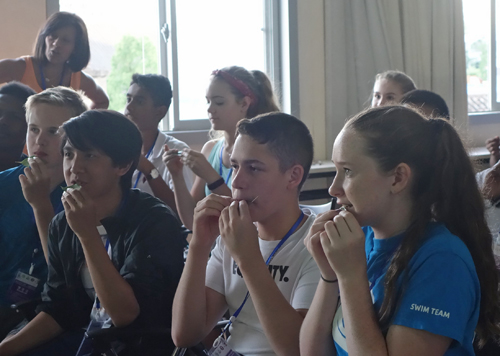
Learning to whistle with leaves
For these classes, summer camp students were taught by highly qualified professionals that provided them hands on learning experiences. While the martial arts class was a favorite among all the summer camp students, each class was equally enjoyable. One summer camp student was inspired enough by his time in China to make a recreation of the Great Wall and its surrounding mountains during his time in the paper cutting class.
When not sight-seeing, learning about Chinese culture and history, shopping for souvenirs, and trying out new and traditional foods, summer camp students were able to spend time with local students, practicing their conversational Chinese, and learning more about the experience of being raised in the Chinese Culture. Chinese Bridge Summer Camp Students were also able to play sports, socialize, and practice their conversational Chinese language skills.
The big city was not the only destination for the campers. Much of the trip was spent in the city of Kunming in the Yunnan province, southwest across the country from Beijing.
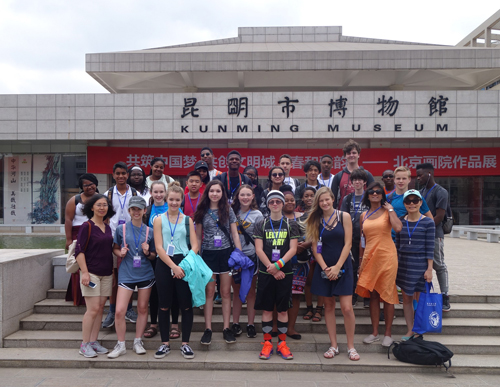
Kunming Museum
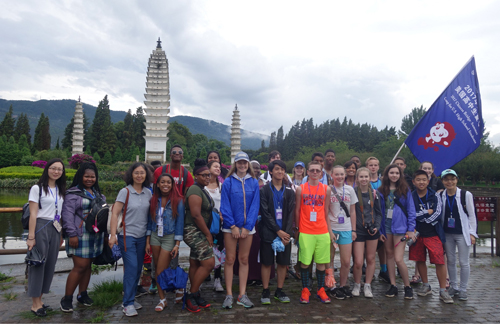
Kunming Village
While in Yunnan, summer camp students were able to see the countryside, visit the Stone Forest, see the Flying Tigers exhibition at the Kunming Museum, participate in a Chinese Martial Arts class, learn about Chinese folk music, as well as to visit the ethnic villages that are home to 26 representative ethnicities in Yunnan Province in order to admire the cultures they maintain.
According to tradition, the Stone Forest visited by summer camp students was home to a beautiful young woman. After this young woman fell in love, and was forbidden to marry her suitor, she turned into a stone in the forest. In actuality, the Stone forest is a giant, natural lime stone formation that has been created by erosion and formed over 270 million years ago. Tall stone pillars spring out of the ground and pools of water, almost tree-like. Summer camp students and other visitors were able to walk the ground, admire the natural beauty of the lime stone formations, and immerse themselves in an area that still holds the Torch Festival for the Yi people of the area. 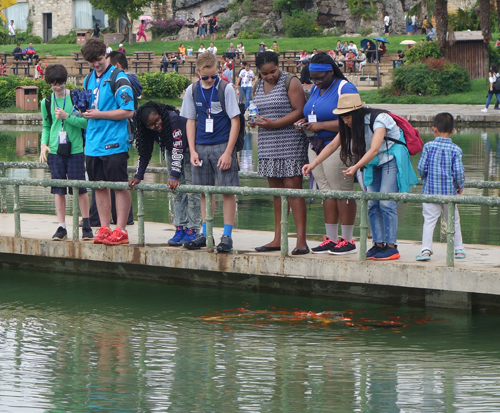
Feeding Koi fish at the pond in Yunnan
The Yunnan province is also home to the Yunnan Ethnic Museum, cultural village, and home to the Flying Tiger Exhibition. While there, students participated in traditional music classes, received the ability to learn about, and play, traditional folk music instruments, as well as to watch the trendy Chinese square dances. 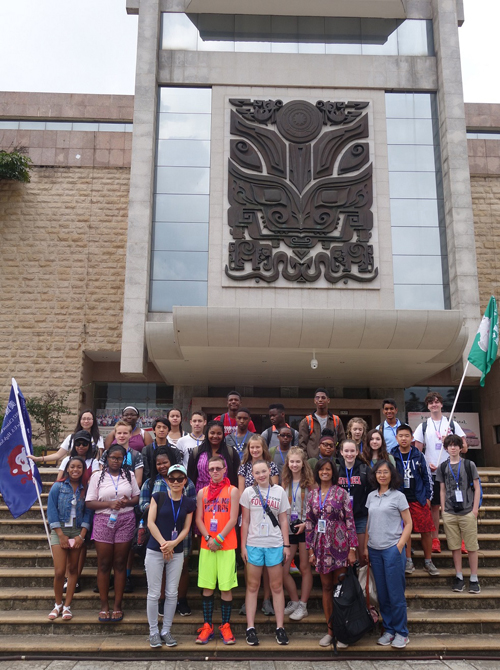
Yunnan Ethnic Museum
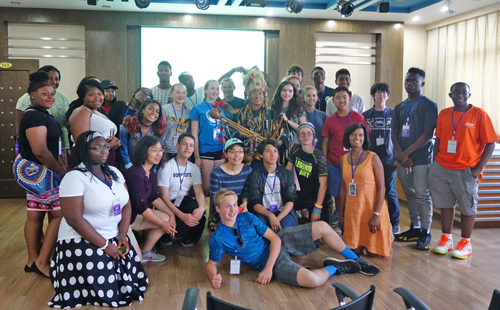
Students with folk musicians
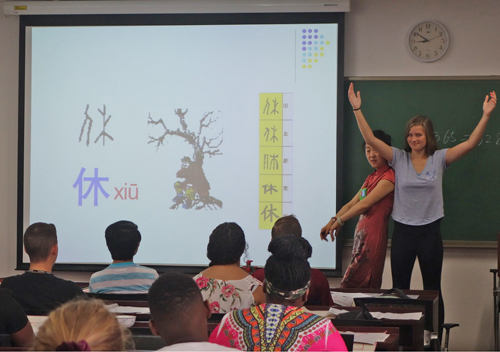
With the local minority of Yunnan Shilin
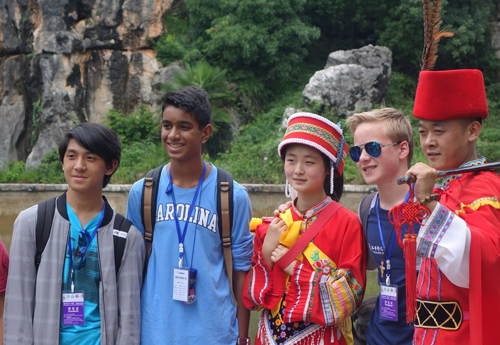
At the end of the trip, campers returned for one more night in the city of Beijing. Once there, summer camp students were treated to a diploma ceremony to commemorate their time abroad, providing them with something to take home and share with their families.

Students showing off their certificates of completion issued jointly by the Capital University of Economics and Business & Yunnan Normal University
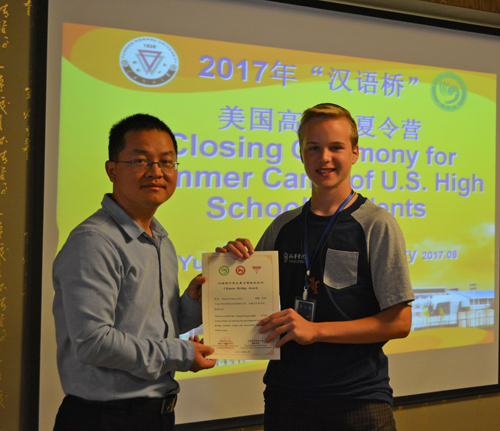
On the last day in Kunming, summer camp students were also given the opportunity to reflect upon their time in China, and to put their thoughts and feelings into words.
One student Brandon Worthy wrote that each day in China gave him new insight on how to go about living life. Worthy also claims that because of the trip, he learned a great deal about different, global perspectives, materialism, and about finding happiness in life. All students said that they enjoyed the trip, and wanted to return to China for a visit for either pleasure, business, education, or a combination of the three.
The Chinese Bridge Summer Camp Program through Cleveland State University Confucius Institute is an annual opportunity that will again happen in the summer of 2018. Eligible students should be aged 15 to 18 (or grades 9th through 12th). Students should have taken, or should currently be taking a Chinese language class, or have a significant interest in Chinese culture and language. Students must have a valid passport, and must be healthy enough for quite a bit of travel. Students must have taken a Chinese language proficiency test (HSK/YCT). If parents have any further questions in regards to the Chinese Bridge Summer Camp, or any of the other programs offered by the Confucius Institute, please direct inquiry emails to Zijie Li via email at l.li89@csuohio.edu.
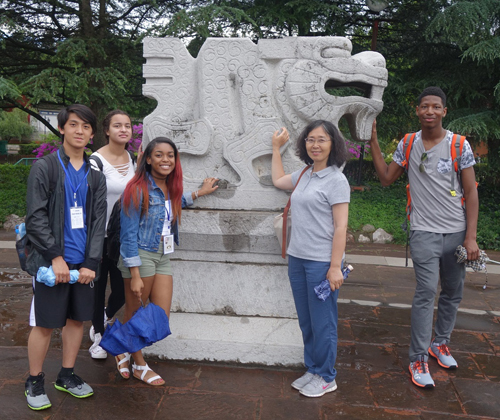
Descendants of the Dragon
Back to Top
Back to Cleveland Chinese
|





